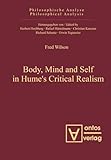Body, Mind and Self in Hume’s Critical Realism / Fred Wilson.
Material type: TextSeries: Philosophische Analyse / Philosophical Analysis ; 22Publisher: Berlin ; Boston : De Gruyter, [2013]Copyright date: ©2008Description: 1 online resource (512 p.)Content type:
TextSeries: Philosophische Analyse / Philosophical Analysis ; 22Publisher: Berlin ; Boston : De Gruyter, [2013]Copyright date: ©2008Description: 1 online resource (512 p.)Content type: - 9783110326680
- 9783110327076
- 190 23
- B1498
- online - DeGruyter
- Issued also in print.
| Item type | Current library | Call number | URL | Status | Notes | Barcode | |
|---|---|---|---|---|---|---|---|
 eBook
eBook
|
Biblioteca "Angelicum" Pont. Univ. S.Tommaso d'Aquino Nuvola online | online - DeGruyter (Browse shelf(Opens below)) | Online access | Not for loan (Accesso limitato) | Accesso per gli utenti autorizzati / Access for authorized users | (dgr)9783110327076 |
Browsing Biblioteca "Angelicum" Pont. Univ. S.Tommaso d'Aquino shelves, Shelving location: Nuvola online Close shelf browser (Hides shelf browser)

|

|

|

|

|

|

|
||
| online - DeGruyter Acquaintance, Ontology, and Knowledge : Collected Essays in Ontology / | online - DeGruyter Ontology and Analysis : Essays and Recollections about Gustav Bergmann / | online - DeGruyter Persistence / | online - DeGruyter Body, Mind and Self in Hume’s Critical Realism / | online - DeGruyter Omniscience : From a Logical Point of View / | online - DeGruyter Tropes, Universals and the Philosophy of Mind / | online - DeGruyter Substantia - Sic et Non / |
Frontmatter -- Acknowledgments -- Note -- Table of Contents -- Introduction -- Endnotes to Introduction -- Chapter One: Self as Substance -- Chapter Two: Nominalism and Acquaintance -- Chapter Three: From the Substance Tradition through Locke to Hume: Ordinary Things and Critical Realism -- Chapter Four: The Disappearance of the Simple Self: Its Problems -- Chapter Five: Hume’s Positive Account of the Self -- Bibliography -- Index of Names -- Backmatter
restricted access online access with authorization star
http://purl.org/coar/access_right/c_16ec
This essay proposes that Hume’s non-substantialist bundle account of minds is basically correct. The concept of a person is not a metaphysical notion but a forensic one, that of a being who enters into the moral and normative relations of civil society. A person is a bundle but it is also a structured bundle. Hume’s metaphysics of relations is argued must be replaced by a more adequate one such as that of Russell, but beyond that Hume’s account is essentially correct. In particular it is argued that it is one’s character that constitutes one’s identity; and that sympathy and the passions of pride and humility are central in forming and maintaining one’s character and one’s identity as a person. But also central is one’s body: a person is an embodied consciousness: the notion that one’s body is essential to one’s identity is defended at length. Various concepts of mind and consciousness are examined - for example, neutral monism and intentionality - and also the concept of privacy and our inferences to other minds.
Issued also in print.
Mode of access: Internet via World Wide Web.
In English.
Description based on online resource; title from PDF title page (publisher's Web site, viewed 28. Feb 2023)


